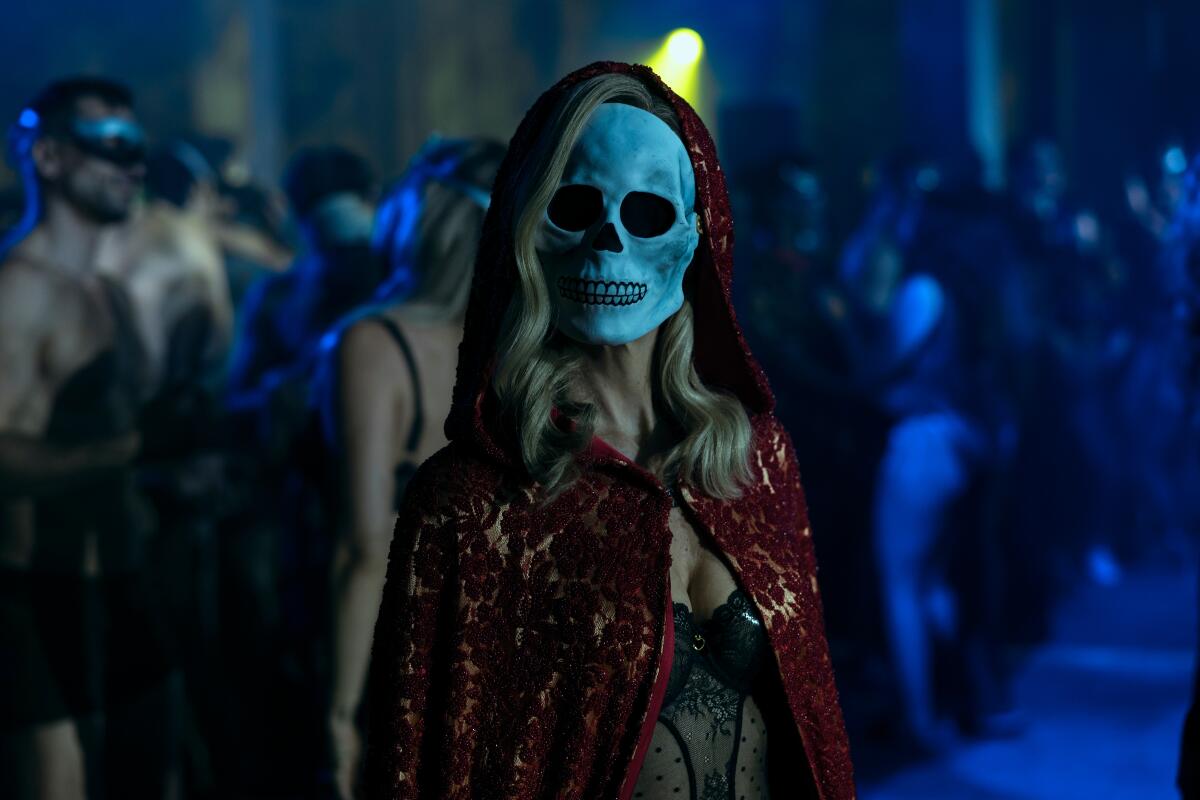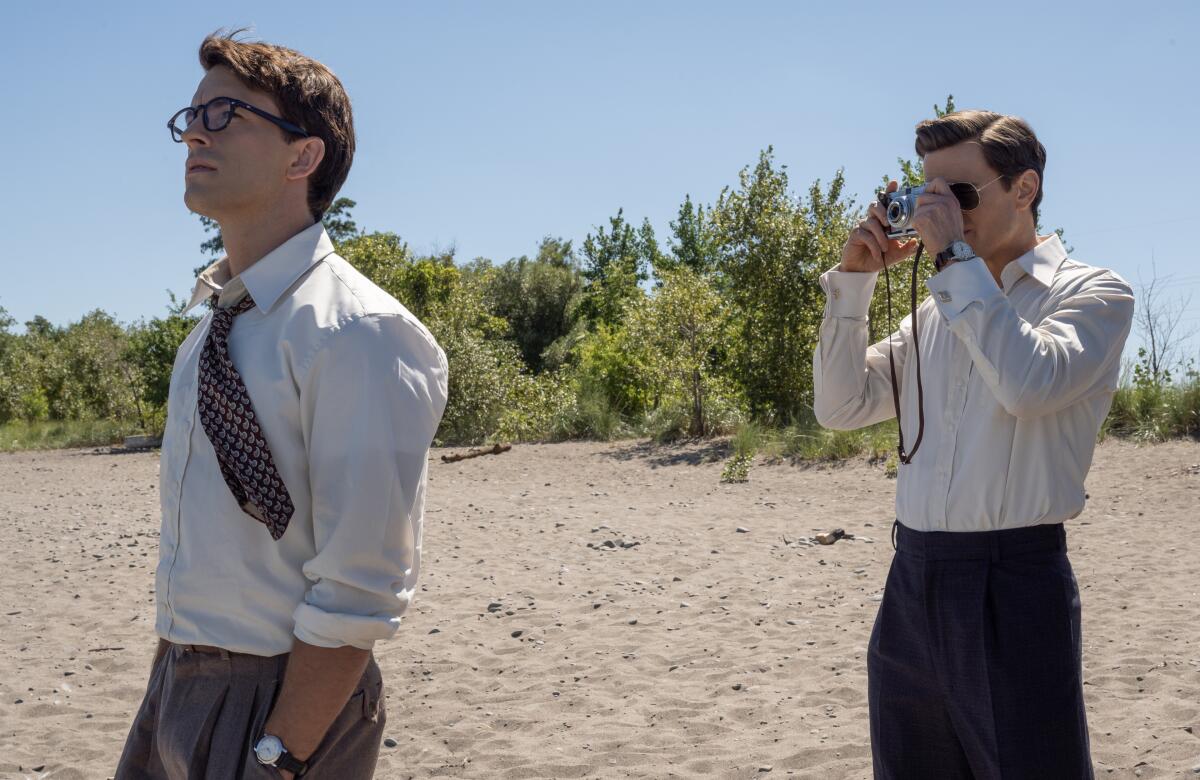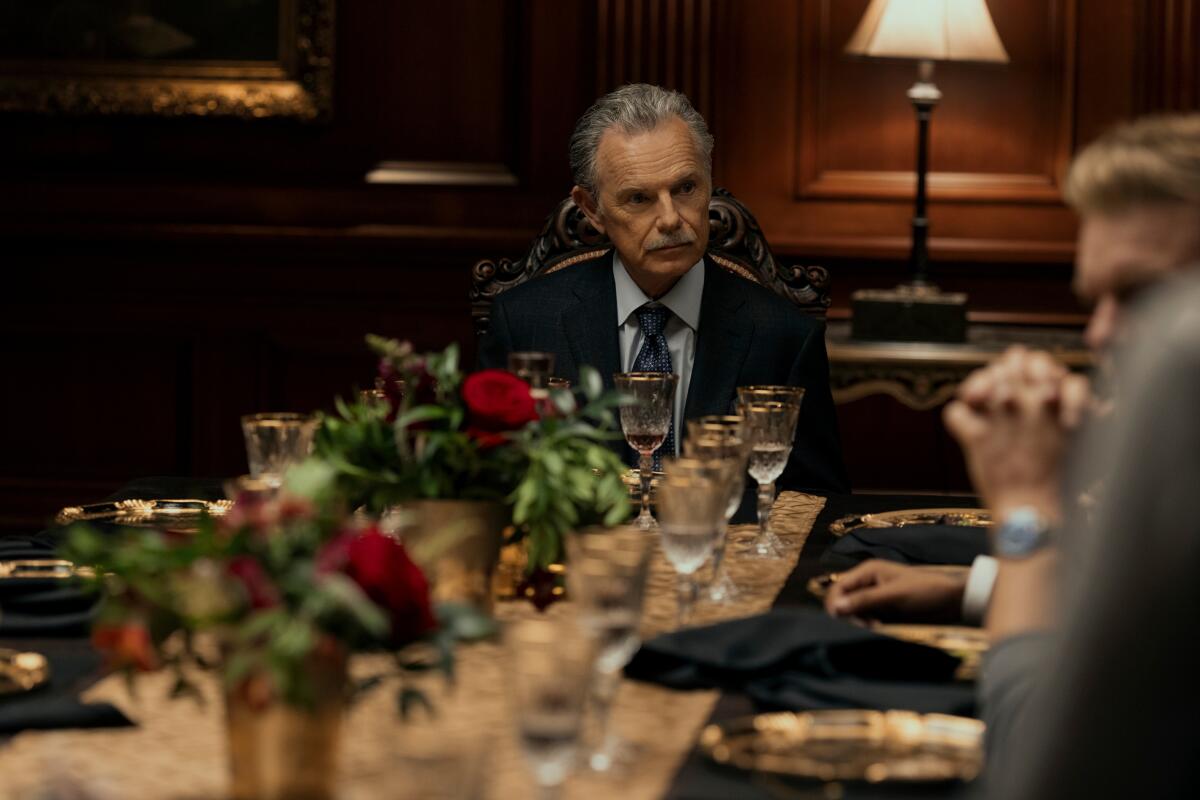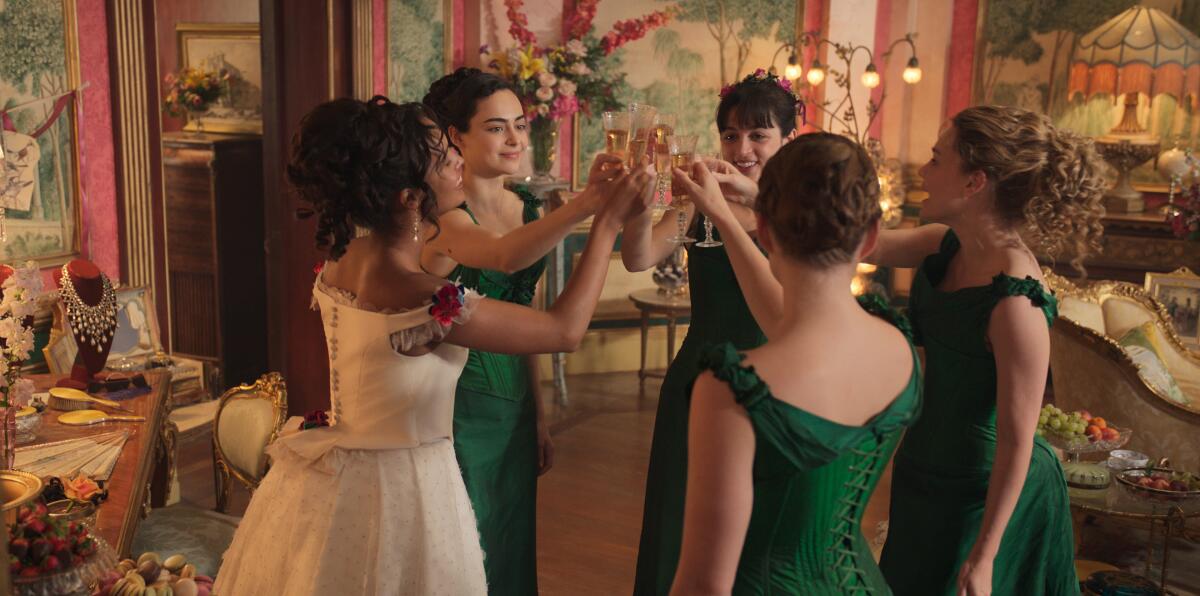Why Netflix’s buzzy ‘Fall of the House of Usher’ is an emotional letdown

- Share via
Welcome to Screen Gab, the newsletter for everyone who loves a dissenting opinion.
As horror buff David Viramontes writes in this week’s edition, “The Fall of the House of Usher” may have received favorable notices from critics, but Mike Flangan’s latest (and, for now, last) Netflix project has its share of flaws.
Catch up on the Poe-inspired limited series in Screen Gab no. 107, where you’ll also find a pair of streaming recommendations for your weekend and learn which costume drama inspired Apple TV+’s new show “The Buccaneers.”
The complete guide to home viewing
Get Screen Gab for everything about the TV shows and streaming movies everyone’s talking about.
You may occasionally receive promotional content from the Los Angeles Times.
ICYMI
Must-read stories you might have missed

Mo Amer’s comedy is centered on his Palestinian heritage. Now with a war, it’s hard to laugh: The comedian spoke to Times TV critic Lorraine Ali about the Israel-Hamas war, its effect on him, and the writing of his Netflix show’s second season.
Depicting blindness in ‘All the Light We Cannot See’ ‘changed me,’ director says: Shawn Levy wanted to accurately portray vision impairment in Netflix’s historical drama. Consultant Joe Strechay helped him find a new directing approach.
Netflix has Oscar hopes for its Diana Nyad biopic. But the swimmer’s exaggerations cast a pall: “Am I embarrassed to have inflated my own record when my record is pretty good on its own? Yes, it makes me cringe,” the legendary swimmer told The Times.
The Hollywood strikes are finally over. But we won’t repair the damage any time soon: By forcing the writers’ and actors’ strikes, the studios cost the California economy more than $5 billion and caused untold anguish. Those wounds won’t heal overnight.
Turn on
Recommendations from the film and TV experts at The Times

“Fellow Travelers” (Showtime)
Anchored by Jonathan Bailey (“Bridgerton”) in a career-changing performance, “Fellow Travelers,” half political thriller and half erotic melodrama, is the finest, frankest treatment of the Lavender Scare ever put on screen — not least because its queer characters include collaborators as well as targets. After sparking a torrid, kinky affair with self-assured State Department bureaucrat Hawkins “Hawk” Fuller (Matt Bomer), Bailey’s winsome Tim Laughlin, an Irish Catholic anti-communist, lands a job in Joseph McCarthy’s office just as the Wisconsin senator launches his purge of “deviants” in federal government. From here, the series weaves together Washington, D.C.’s halls of power, its LGBTQ+ demimonde and our protagonists’ intense connection into a portrait of queer life in midcentury America as spiky, and spirited, as it is sprawling. Still, “Fellow Travelers,” created by Ron Nyswaner from Thomas Mallon’s novel, isn’t just remarkable in its own right, or for Bailey’s magnetic turn as an idealist in a land of cynics. Part of a string of radical histories to appear on TV since “The Assassination of Gianni Versace: American Crime Story” — including “A League of Their Own,” “Gentleman Jack” and “Dickinson” — it’s a potent reaffirmation that the LGBTQ+ period piece is now the medium’s most creatively fertile genre. —Matt Brennan

“Dumb Money” (VOD, multiple platforms)
In case you missed its Toronto International Film Festival premiere or the start of its theatrical run (and plenty did), consider this a friendly reminder that Craig Gillespie‘s ripped-from-the-headlines dramedy about the Game Stop short squeeze of 2021 is smarter than you might expect. Written by former journalists Lauren Schuker Blum and Rebecca Angelo, “Dumb Money” channels a cavalcade of stars into the barnstorming tale of a Boston-area Robin Hood, Keith Gill (Paul Dano), who turns the tables on a rapacious hedge fund founder (Seth Rogen) eager to put the video game store out of business — and in turn inspires a stick-it-to-the-man movement that includes America Ferrara, Anthony Ramos and Myha’la. As an avid news consumer whose understanding of the real-life story was more or less limited to the word “stonks,” “Dumb Money” not only kept me entertained, it finally clued me in to why the Game Stop surge really mattered: Frenetic, shallow, incandescently angry and hopelessly funny, it may not be a great movie, but it is doubtless an epochal one. Call it a middle-aged millennial trashterpiece. —Matt Brennan
Catch up
Everything you need to know about the film or TV series everyone’s talking about

What if the Roy family from “Succession” finally paid for their crimes? What if a supernatural entity meticulously planned the downfall of Waystar Royco and the death of the Roy bloodline? That’s more or less the question that Mike Flanagan’s “The Fall of the House of Usher” (Netflix) answers as it tracks the death, one by one, of the Ushers — the family behind a pharmaceutical company that profits by pushing opioid pills.
Prior to “Usher,” the prolific filmmaker has been in something of an imperial phase. In the seven-year span starting with his 2017 film “Gerald’s Game,” Flanagan has made six Netflix projects and written and directed “Doctor Sleep,” a legacy sequel to Stanley Kubrick’s “The Shining,” for Warner Bros. But it’s the emotional wallop of his TV work that’s won him legions of horror fans.
Starting with 2018’s “The Haunting of Hill House,” Flanagan has become synonymous with a slow-burn balance of visceral scares and empathetic human stories, not to mention a preternatural ability to build a mounting sense of dread from every moment. By contrast, “Usher” asks viewers to root against its main characters rather than for them, consistently highlighting how undeserving they are of our sympathy. And the result is a story that holds the viewer at arm’s length from its own emotional core.
We’re given glimpses of the Ushers’ humanity, in youngest son Prospero’s (Sauriyan Sapkota) drive to prove himself or patriarch Roderick’s (Bruce Greenwood) affection for his granddaughter, but time and again viewers are reminded of how morally bankrupt this family is. While one can and will get invested in these characters, the only thing we want is for their stories to end. And end they do.
Each episode adapts an Edgar Allan Poe short story in the form of a dramatic death scene — think the swinging blade from “The Pit and the Pendulum” or the elaborate confession in “The Tell-Tale Heart” — and while these sequences are interesting to watch play out in their “Final Destination”-esque fashion, they simply don’t carry as much weight as the grief we feel for Nell in “Hill House” or the mourning over Riley in “Midnight Mass.”
While all the cast members acquit themselves quite well, the star of the show is Greenwood. He took over the role of Roderick Usher from Frank Langella, who was fired during production amid an investigation into sexual harassment. It’s hard to avoid thinking about how a last-minute change like this might have affected the scope of the series. Were the majority of Roderick’s scenes intended to be limited to one location? Was the show restructured to meet a new release date?
Coming on the heels of 2022’s “The Midnight Club,” which landed to mixed reviews and failed to generate the sort of buzz his earlier projects had, the questions and qualms that come with “Usher” may be a sign that Flanagan is due for a change of pace. And on that front, at least, his fans are in luck: Earlier this year, he signed a first-look deal with Amazon, marking an end to his working relationship with Netflix. Only time will tell if he remains as prolific at his new home, but one thing is certain.
No one is doing it quite like Mike Flanagan. —David Viramontes
Guest spot
A weekly chat with actors, writers, directors and more about what they’re working on — and what they’re watching

Based on Edith Wharton’s final, unfinished novel, “The Buccaneers” (Apple TV+) finds five American women in London, where their (new) money affords them entree to high society it doesn’t in New York. (Just ask Bertha Russell!) But although the very modern period piece bears a resemblance to “Bridgerton” and “Dickinson,” as TV critic Robert Lloyd writes in his review, creator Katherine Jakeaways points to another project as the series’ most important touchstone: Greta Gerwig’s “Little Women.” Jakeaways and director Susanna White stopped by Screen Gab recently to discuss why Wharton works with a contemporary lens, their favorite costume dramas and what they’re watching. —Matt Brennan
What have you watched recently that you are recommending to everyone you know?
Katherine Jakeaways: If I’m giving recommendations, I’d check if the person’s already seen “Better Things” [Hulu] and “Colin From Accounts,” then I’d go for “Hacks” [Max] or “Shrinking” [Apple TV+]. We’re also currently watching “Jury Duty” [Amazon Freevee], which I’m loving. All half-hour shows, weirdly. I do love a proper drama, but then a good half-hour show to see you off to bed.
Susanna White: The thing I’m recommending to everyone is “Barbie” [VOD, multiple platforms]. Greta Gerwig is the most incredible talent and the movie felt so fresh. It’s humane, political, moving and great, great fun. The design by Sara Greenwood is superb, Jacqueline Durran’s costumes pure joy, and the acting absolutely wonderful. Plus the experience of being back in a packed movie theater was special in itself. The script is so clever — on one level it works as a delicious confection but the big themes of the film and its take on the world we live in resonated with me for weeks afterwards.
What’s your go-to “comfort watch,” the movie or TV show that you go back to again and again?
White: The thing I always go back to is Jane Campion’s “The Piano” [Pluto TV]. It is such an amazing piece of visual storytelling with wonderful performances from Holly Hunter, Sam Neill, Harvey Keitel and Anna Paquin. Michael Nyman’s score is one of my favorite film scores ever. Like Gerwig, Campion has a very strong voice.
Jakeaways: Obviously, “Friends” [Max] is the ultimate comfort watch. Having come of age in the 1990s, I’ve spent a lot of my life basically putting on “Friends” like people used to put on the electric fire.
Historical dramas that put a modern spin on the period in which they’re set — instead of attempting to render it with perfect accuracy — are all the rage. What makes London in the 1870s ripe for that treatment?
Jakeaways: It’s not so much the location that makes “The Buccaneers” perfect for a modern lens, but the source material. Edith Wharton wrote the most wonderful start to a story. Her characters already feel contemporary... and the idea of these vibrant, bright, modern feeling girls arriving like whirlwinds into the fusty, traditional drawing rooms of Victorian London is irresistible. It’s already a story of old versus new.
White: In all the period dramas which I have directed, from Carey Mulligan in “Bleak House” to Ruth Wilson in “Jane Eyre,” my approach has always been that it is a complete accident of fate when our piece of DNA arrives on the planet — we’d be the same person whether we were born in 1670 or 1970. The girls we follow in “The Buccaneers,” born in New York or London in the 1870s, grow up in a world where their only route to power and independence is through marriage. We were drawn to what that does to you if you don’t feel you are beautiful or if you don’t have inherited wealth or you don’t connect with traditional binary relationships. Katherine brilliantly draws the anxiety the girls experience when they are put into that pressure cooker — panic attacks are not unique to our decade.
What’s the costume drama/period piece that most inspired you or informed your approach on “The Buccaneers” and why?
White: I have always loved Sofia Coppola’s “Marie Antoinette” [VOD, multiple platforms] and it is something that I kept coming back to as a reference when I was was prepping this series. Coppola presents Kirsten Dunst as a young woman feeling universal emotions, not fossilized in 18th-century France — making us connect to her through images of universal girlhood, seeing her without her corset, pulling out parallels through the contemporary score and through things like her relationship with her dog. Things which are very relatable, while at the same time offering the most superb design of her bedroom at Versailles, perfect pastel macarons, heavenly costumes, beautiful horses. It outshines the real Versailles in its brilliance.
Jakeaways: Growing up, I loved Andrew Davies’ “Pride and Prejudice” [Hulu, BritBox]. And my favorite more recently has been his 2016 adaptation of “War and Peace” [Prime Video, Freevee]. I’ve watched it several times and the casting and writing is so perfect. But Gerwig’s “Little Women” [Starz] was the period drama we talked about most in the development of “The Buccaneers.” Her characters and dialogue strike such a perfect balance of feeling entirely modern without being anachronistic. She’s made them all people you want to spend time with.
The complete guide to home viewing
Get Screen Gab for everything about the TV shows and streaming movies everyone’s talking about.
You may occasionally receive promotional content from the Los Angeles Times.



